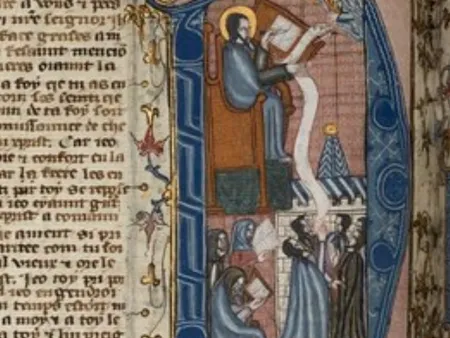The ongoing coronavirus pandemic has caused significant disruptions to universities across the world. Social distancing and the rapid shift to online learning have strained the ability of educators to teach courses as they normally would. Alongside these teaching changes, scholars, especially in the social sciences and the humanities, no longer have access to critical library resources to do research.
I have created two new online resources to help with these two problems. The first is Middle Ages for Educators (#middleagesforeducators). This website offers resources for teaching and research on the Middle Ages. The second is a podcast, Infectious Historians, and an accompanying website that provides information on historical pandemics.
Middle Ages for Educators was created along with my colleagues, Sara McDougall (Associate Professor, John Jay College) and Laura Morreale (Italian Medieval Historian and Digital Humanities Specialist), since we encountered pleas for teaching and research help across social media, through list servs, and via personal emails. As a response to this challenge, our site offers teaching resources in all types of media and open-access research links, plus a database of medieval scholars who might have resources that other scholars need.
Middle Ages for Educators offers short teaching videos, such as my own on the Justinianic Plague that is accompanied by a PDF of sources that students can read plus questions for them to answer. As another example, Professor Dan Smail of Harvard University has offered "A Life in the Black Death" video that describes how one woman’s life was changed by the Black Death in 1348 Marseille. Our website also offers links to texts from the Middle Ages in English translation (sources from the time were written in Latin, Greek, Syriac, Arabic, and other languages) along with podcasts, YouTube lectures from other scholars, and specialists’ lectures that are available online.
Middle Ages for Educators also provides Linked Resources on all types of research topics. We have included databases of sources from the medieval period, specialist literature on pandemics and plague, digitized manuscripts and books written during the medieval period, and links to publishers who have made their materials open-access for the next several months. We hope these resources provide scholars with materials they are used to finding in their local library or requesting on Interlibrary Loan, but which are now harder to find. If they need more help, our database of Medievalists at the Ready lists scholars by field, their specialty, and what resources they can lend to other scholars.
My second outreach effort is a website and podcast called, Infectious Historians, with my colleague and former SESYNC postdoctoral fellow, Lee Mordechai (now a Senior Lecturer at the Hebrew University of Jerusalem). Our podcast explores the history of pandemics across the world including: the Justinianic Plague, the Black Death, smallpox, and the 1918 Flu Pandemic among many others. We discuss what happened during these pandemics, the latest scholarship on them, and the effects they had on states, societies, and individuals who lived through them. The podcast also has thematic episodes that focus on topics of importance today such as the history of quarantine, disease modeling, and questions of social justice and equality.
Some of these episodes are on topics of our specialty while for others we will bring in cutting-edge researchers to discuss them. The podcast also has lighter elements, as well, since many of us will remain in our houses for the foreseeable future. At the start of each episode, Lee and I offer an update on what is happening in Annapolis, MD and Jerusalem, Israel and we close each episode on a lighter note with some suggestions for TV watching, exercise, or cooking.
Each episode is also be accompanied by background material on our website along with further readings for listeners who want to know more about a particular topic. Finally, the website offers some basic information on different historical pandemics—a cheat sheet—along with various short blog entries about pressing current events.
We do not know how long we will be working and teaching from home. But, I hope these resources provide new ways for scholars, educators, and the public to learn about the Middle Ages and make the history of pandemics accessible for the future.
Information about the Author:
Merle Eisenberg is currently a postdoctoral fellow at the National Socio-Environmental Synthesis Center (SESYNC) at the University of Maryland and received a PhD in history from Princeton University. He works on the history of pandemics and disease, environmental history, and the fall of the Roman Empire. He has published articles in Past & Present and Byzantine & Modern Greek Studies among others. His work has also appeared in The Proceedings of the National Academy of Sciences, which received press coverage in CNN, Fox News, USA Today, and the NY Post. His recent outreach efforts include an op-ed at the Washington Post and an interview on CNN. You can follow him on Twitter @MerleEisenberg.
